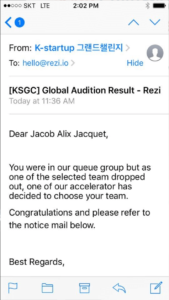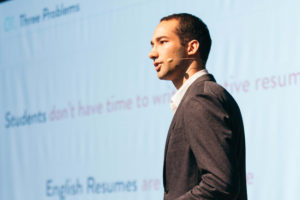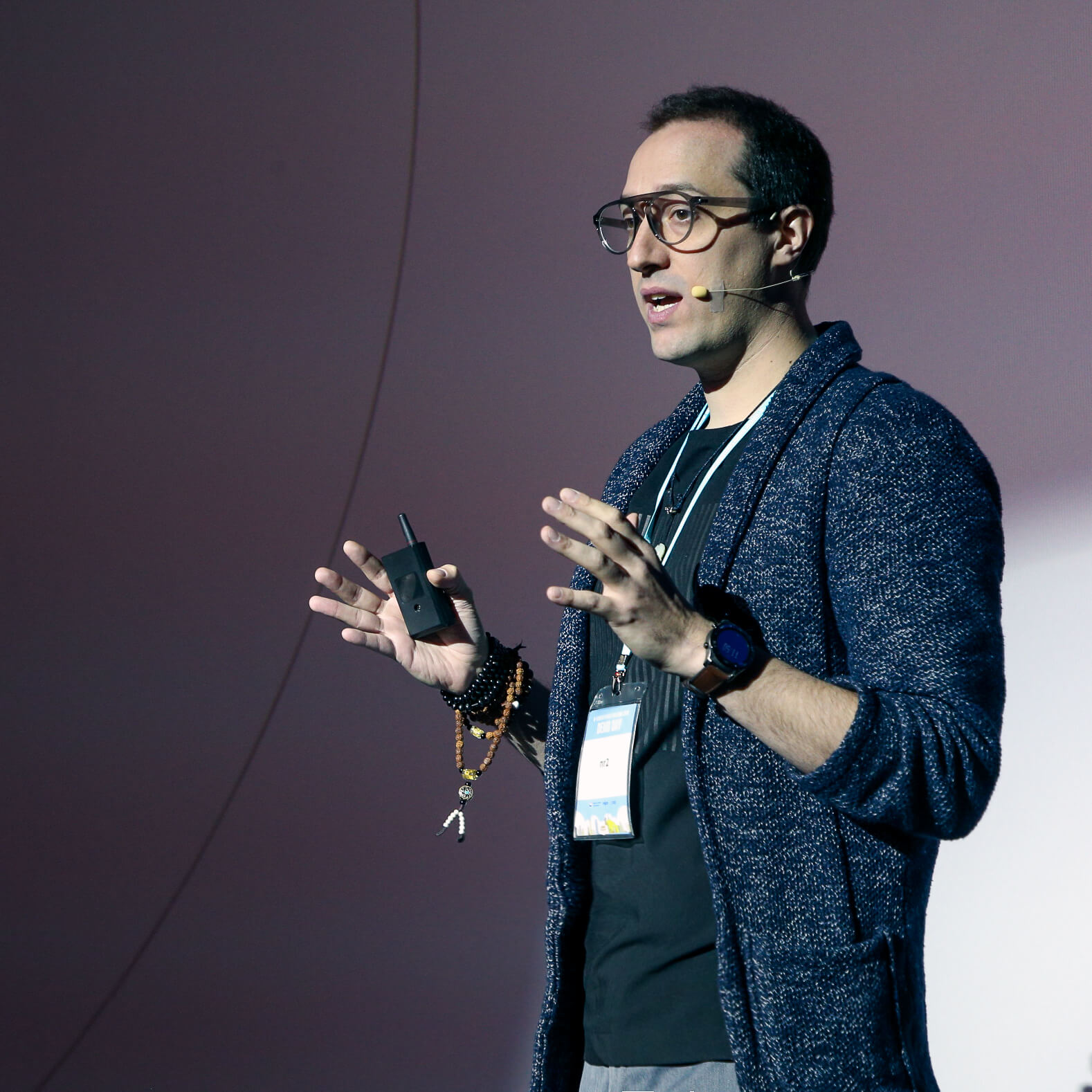In 2016, 23-year-old Jacob Jacquet, the current CEO of the resume-optimization platform Rezi, came to South Korea with a mission to fulfill his dream to be an entrepreneur. A brilliant idea and an opportunity to be part of the K-Startup Grand Challenge 2017 program ensured that he achieved his goals.
The startup, Rezi, uses the latest technology to create resumes that are optimized to pass modern hiring systems, helping hundreds of thousands of job seekers to get selected for relevant job interviews. Jacob got the idea as a fresh graduate when his resume scored well despite his disappointing GPA scores.
Jacob has now been living in South Korea for four years, and his company has bagged some significant clients there. In the following interview with Koreatechdesk.com, Jacob shares his experiences in business and investment and talks about his plans for the future.
1. Tell us how you got the idea for your startup?
I started Rezi in America in 2015. I’d just graduated from college with a GPA of 2.2—I never was an A-student. But when I applied for jobs, I found myself being selected for interviews with firms like Google, Goldman Sachs, and other global giants. Something told me my resume was everything it needed to be, a fact that got me interested in digging deeper into the hiring systems these companies use. Anyway, my investigations revealed that my resume happened to be optimized to pass the system used by almost all these companies—a pretty insightful secret! When I told my friends how it worked, we decided to turn the idea into a company, and we’ve now been in business for five years.
2. Why did you decide to explore business in South Korea?
In 2016, after working on Rezi in America for six months, I decided to go global. That’s why I moved to South Korea. I come from humble origins in a really small American town. My dad was a French immigrant. He’d spent a lot of time traveling and encouraged me to do the same to “see the world,” as he put it. So a trip to Korea was a great opportunity to take my father’s advice and do some business. I’d figured that South Korea was ready for Rezi, what with a large number of English speaking people, the difficult job market, and the government support. Apart from that, I wanted to try to do something impossible – a quote by Albert Camus has stuck with me – “a man who sets himself against the impossible will surely discover every single opportunity that isn’t impossible along the way.”
3. When did you get into the K-Startup Grand Challenge program?
I was accepted for the K-Startup Grand Challenge program in July 2017. At the time, I was working on Rezi as kind of a side project. I’d been teaching English for a year and a half. So getting onto the program was my first step in the process: from launching the product to becoming a full-fledged company. Without this program, we would have failed. So this was very important.

4. What about the visa to live and do business in Korea?
When I first went to Korea, I had the E-2 visa for English teaching, so I wasn’t allowed to set up a company. That’s why Rezi was initially registered in North America. But, once we got into the K-Startup Grand Challenge program, we switched from the E-2 to a D-8-4 visa, which covers global executives like CEOs. And that is certainly a difficult visa to get. You had to go through a lot of complicated steps to get the 80 visa points we needed. Luckily, being in the K-Startup Grand Challenge helped us a lot. I can now stay here for three years with appropriate annual renewals.
5. In your opinion, how is South Korea for business opportunities?
As a CEO, I not only have to think about the company’s present but its future as well. It’s no good thinking short term. For us, South Korea is an exciting country to do business in. Within the next three to five years, there are going to be more English speakers in the country and the jobs market will be much more competitive. Many other global companies are currently expanding to South Korea, mainly because of the very technical, well-educated labor force available. And South Korea is particularly interesting for us because there’s no market leader in English resume software.
Right now, it’s all done through expensive consultants who don’t have the scalable tools or resources to provide the two million young people in the job market with software like Rezi. Domestic competitors have completely overlooked this opening, and as a global company, we’re in an excellent position to become the market leader. We’ve seen this in our partnership with JobKorea, who use Rezi for all of the English resume needs of their 1.5 million users. So that fact alone is a significant accomplishment. Last week, we signed a contract with Seoul National University to provide English resume software to all of their students, at no charge to the students themselves. So, what we are seeing is that massive industry-leading organizations are starting to rely on Rezi for the English resume needs.
6. Did you face any difficulties starting a business in Korea, considering the cultural differences?
Well, in my case, to be honest, it didn’t particularly worry me. I accepted that, “It is what it is.” I see obstacles as challenges rather than difficulties—things that can be solved by formulating a certain set of actions. In our case, it was overcoming the language barrier by hiring someone to help us communicate; someone who was also a highly skilled and productive salesperson. My advice to anyone thinking about going into business here is, focus on your strengths and leverage other people to supplement your weaknesses. Realize it’s going to be hard, and don’t worry too much. Focus on what’s going well, and focus on your vision and what you need to achieve. And, of course, find time to take care of yourself.
7. What is your vision of the future for your business in Korea?
I think we can safely continue to do business in Korea; there are still plenty of organizations that can benefit from our services. I see our business plan maturing, not only in helping the job market but also leveraging our data to help companies connect with the job seekers. Once we get to that point, our vision is to quickly expand the size of the company as well as expanding into other countries if we decide to retain the B2C option. Right now, we’re serving one university and one organization in a country with 340 universities and who knows how many organizations. So there’s a tremendous amount of work for us to do.
8. Was it difficult to secure investors? How has your journey been to get funding?
It’s always difficult. You’re up against a series of hurdles. Of course, it is totally possible, but it forces you to make sure your operations are as attractive as they can be. If your business model or any other aspect of your company has the slightest weakness, it’s that much harder to get funds. So it just forces you to do a good job. For us, it’s been a blessing because, for four years, we were unable to raise enough money to develop the next generation of our software. But by the time we got our first private investment, we were so well organized that we executed the development and marketing of the new software far more efficiently, and now we are profitable.

9. What advice would you give to future startup founders who want to apply for a program like the K-Startup Grand Challenge?
If you’re considering the Korean market, the K-Startup Grand Challenge is by far the best program to help you and land you on your feet here. The program makes sure you are supported in many different areas of business, not just in finance, but also connecting you to companies, making sure needs like hiring are met, and much more besides. The program really cares, and that’s fantastic. It is difficult to move to Korea, and it does take a lot of time to set up a business, but it’s not impossible. The K-Startup Grand Challenge gives you two major benefits in the shape of the monthly stipend, which takes care of your various expenses for living and business; and the networking opportunities, which introduce you to invaluable connections to help your business expand in the Korean market.






